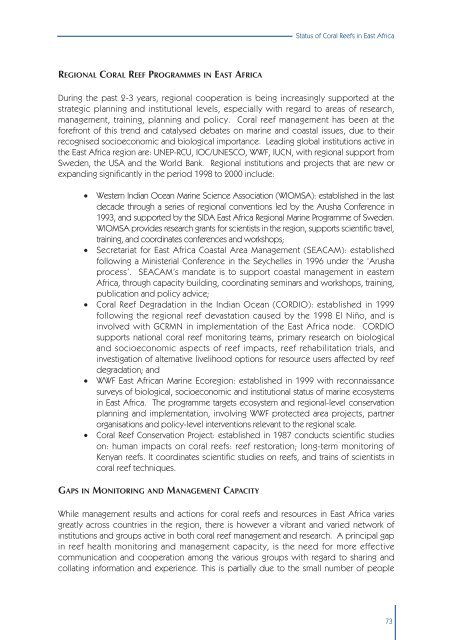Status of Coral Reefs of the World 2000
Status of Coral Reefs of the World 2000.pdf
Status of Coral Reefs of the World 2000.pdf
- No tags were found...
Create successful ePaper yourself
Turn your PDF publications into a flip-book with our unique Google optimized e-Paper software.
<strong>Status</strong> <strong>of</strong> <strong>Coral</strong> <strong>Reefs</strong> in East Africa<br />
REGIONAL CORAL REEF PROGRAMMES IN EAST AFRICA<br />
During <strong>the</strong> past 2-3 years, regional cooperation is being increasingly supported at <strong>the</strong><br />
strategic planning and institutional levels, especially with regard to areas <strong>of</strong> research,<br />
management, training, planning and policy. <strong>Coral</strong> reef management has been at <strong>the</strong><br />
forefront <strong>of</strong> this trend and catalysed debates on marine and coastal issues, due to <strong>the</strong>ir<br />
recognised socioeconomic and biological importance. Leading global institutions active in<br />
<strong>the</strong> East Africa region are: UNEP-RCU, IOC/UNESCO, WWF, IUCN, with regional support from<br />
Sweden, <strong>the</strong> USA and <strong>the</strong> <strong>World</strong> Bank. Regional institutions and projects that are new or<br />
expanding significantly in <strong>the</strong> period 1998 to <strong>2000</strong> include:<br />
• Western Indian Ocean Marine Science Association (WIOMSA): established in <strong>the</strong> last<br />
decade through a series <strong>of</strong> regional conventions led by <strong>the</strong> Arusha Conference in<br />
1993, and supported by <strong>the</strong> SIDA East Africa Regional Marine Programme <strong>of</strong> Sweden.<br />
WIOMSA provides research grants for scientists in <strong>the</strong> region, supports scientific travel,<br />
training, and coordinates conferences and workshops;<br />
• Secretariat for East Africa Coastal Area Management (SEACAM): established<br />
following a Ministerial Conference in <strong>the</strong> Seychelles in 1996 under <strong>the</strong> ‘Arusha<br />
process’. SEACAM’s mandate is to support coastal management in eastern<br />
Africa, through capacity building, coordinating seminars and workshops, training,<br />
publication and policy advice;<br />
• <strong>Coral</strong> Reef Degradation in <strong>the</strong> Indian Ocean (CORDIO): established in 1999<br />
following <strong>the</strong> regional reef devastation caused by <strong>the</strong> 1998 El Niño, and is<br />
involved with GCRMN in implementation <strong>of</strong> <strong>the</strong> East Africa node. CORDIO<br />
supports national coral reef monitoring teams, primary research on biological<br />
and socioeconomic aspects <strong>of</strong> reef impacts, reef rehabilitation trials, and<br />
investigation <strong>of</strong> alternative livelihood options for resource users affected by reef<br />
degradation; and<br />
• WWF East African Marine Ecoregion: established in 1999 with reconnaissance<br />
surveys <strong>of</strong> biological, socioeconomic and institutional status <strong>of</strong> marine ecosystems<br />
in East Africa. The programme targets ecosystem and regional-level conservation<br />
planning and implementation, involving WWF protected area projects, partner<br />
organisations and policy-level interventions relevant to <strong>the</strong> regional scale.<br />
• <strong>Coral</strong> Reef Conservation Project: established in 1987 conducts scientific studies<br />
on: human impacts on coral reefs: reef restoration; long-term monitoring <strong>of</strong><br />
Kenyan reefs. It coordinates scientific studies on reefs, and trains <strong>of</strong> scientists in<br />
coral reef techniques.<br />
GAPS IN MONITORING AND MANAGEMENT CAPACITY<br />
While management results and actions for coral reefs and resources in East Africa varies<br />
greatly across countries in <strong>the</strong> region, <strong>the</strong>re is however a vibrant and varied network <strong>of</strong><br />
institutions and groups active in both coral reef management and research. A principal gap<br />
in reef health monitoring and management capacity, is <strong>the</strong> need for more effective<br />
communication and cooperation among <strong>the</strong> various groups with regard to sharing and<br />
collating information and experience. This is partially due to <strong>the</strong> small number <strong>of</strong> people<br />
73
















